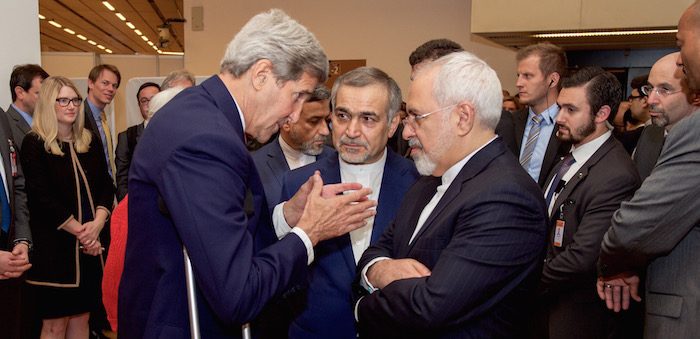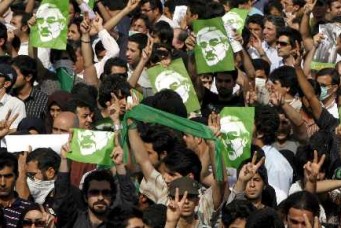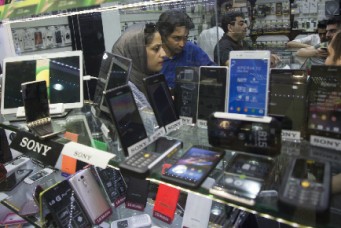The Iran Nuclear Deal
Eight experts on what the nuclear deal means for Iran, the United States, the Middle East, and the world.

Secretary of State John Kerry and Iranian Foreign Minister Mohammad Javad Zarif, Austria Center, Vienna, July 14, 2015. U.S. State Department.
How to prevent the spread and use of nuclear weapons is perhaps the single greatest diplomatic challenge of our age. A particularly serious concern arose in 2002 when evidence came to light that the Islamic Republic of Iran was conducting secret nuclear activities. Iranian leaders steadfastly denied any intention to build a bomb, insisted on Iran’s sovereign right to peaceful nuclear energy, and threatened to withdraw from the Nuclear Non-Proliferation Treaty (NPT). Western powers demanded strict compliance with NPT requirements, and stepped up pressure on Iran with economic sanctions and warnings of military intervention.
European negotiations with Iran began in 2003 and eventually expanded to include all five permanent members of the United Nations Security Council as well as Germany—known as the P5+1. The United States began participating directly in the negotiations in 2013, the highest level of talks since the Iranian revolution and U.S. embassy hostage crisis in 1979. On July 14 came a dramatic announcement at Vienna’s Coburg Palace: the parties reached agreement on a Joint Comprehensive Plan of Action.
The agreement permits but restricts Iran’s uranium-enrichment activities for a period of fifteen years, and allows for intrusive inspections by the International Atomic Energy Agency. It extends for five years and eight years, respectively, United Nations embargoes on sales of conventional weapons and ballistic missiles to Iran. The deal lifts crippling international economic sanctions that have curbed Iran’s oil exports and access to global financial systems, and frees an estimated $100 billion in frozen Iranian assets.
What does the deal mean for Middle East peace and democracy in Iran? Will it lead to a rapprochement between Tehran and Washington? Eight Cairo Review contributors discuss these and other questions in this special edition of Tahrir Forum.
Overcoming a Hard Legacy by John Limbert
With the announcement of a nuclear deal in Vienna, a three-decade freeze in relations between the U.S. and Iran is beginning to break. A former American diplomat with a deep knowledge of Iran explains the way forward.
Why Arabs Are Concerned by Nabil Fahmy
The proposed nuclear deal with Iran is far from sufficient. It delays, but does not close the door on potential Iranian breakout. There is profound concern among Arab leaders, and for good reason.
Beauty of the Pleiades by Turki Al-Faisal
Arabs have the greatest respect for the faith and culture of Iranians, as well as the indelible Persian contribution to the marvels of Islamic society. But like all worthwhile achievements, Persia’s greatest masterpieces were the product of cooperation and education, of learning from and with people of other backgrounds.
Democracy in Iran by Nader Hashemi
The debate on the Iran nuclear deal has largely ignored the effects that an accord might have on politics and society within the country. An Iranian scholar considers what the future might hold.
Human Rights Is Good Business by Gissou Nia
Amid all the excitement over an Iran deal, there has been scant discussion of Iran’s dismal human rights record. The lifting of sanctions presents an opportunity not only for big profits, but gains in the country’s human rights standards.
Tehran’s Post-Deal Dilemma by Tarek Osman
A major success in Tehran’s foreign policy, the nuclear deal imposes an acute dilemma on the regime at home. So far, its leaders seem neither willing nor able to resolve the challenges facing them.
Ending the Iranian-Saudi Cold War by Reza Marashi
A diplomacy deficit between Iran and Saudi Arabia has exacerbated volatility across the Middle East. Ending the Iranian-Saudi cold war, and building a collective security framework for the Middle East is the only option likely to succeed.
Behind Netanyahu’s Obsession by Owen Alterman
Some say Israeli Prime Minister Benjamin Netanyahu is obsessed with the Iranian nuclear issue; others say he just cares deeply about it. Jewish history influences the leader’s policies today.
Subscribe to Our Newsletter





